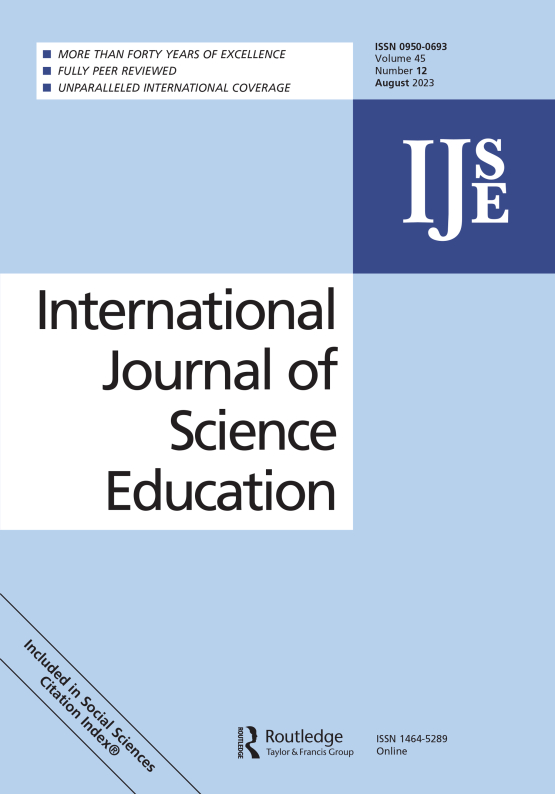Submit a Manuscript to the Journal
International Journal of Science Education
For a Special Issue on
The Game-Changer: Generative Artificial Intelligence for Science Education and Research
Abstract deadline
15 August 2024
Manuscript deadline
15 November 2024

Special Issue Editor(s)
Xiaoming Zhai,
University of Georgia
[email protected]
Robert H. Tai,
University of Virginia
[email protected]
Gyeong-Geon Lee,
University of Georgia
[email protected]
Ehsan Latif,
University of Georgia
[email protected]
Yael Feldman-Maggor,
KTH Royal Institute of Technology
[email protected]
Arne Bewersdorff,
Technical University of Munich
[email protected]
The Game-Changer: Generative Artificial Intelligence for Science Education and Research
| The advent of Generative Artificial Intelligence (GAI) technologies, including large language models like ChatGPT® by OpenAI® and Gemini® by Google Deepmind®, has unveiled considerable potential to revolutionize various facets of science education—ranging from learning goals and curriculum materials to assessment practices and learning outcomes—thereby fostering a more equitable science learning environment. These innovations hold the promise of empowering learners and educators to realize their maximum potential, equipping them with essential tools and scientific acumen crucial for future professional success (Herdiska & Zhai, in press). By customizing educational experiences and aligning them with individual learners' needs, GAI applications facilitate not only the acquisition of specific scientific knowledge and skills but also bolster critical thinking, problem-solving, data literacy, and decision-making capabilities.
Furthermore, GAI's potential to automate routine educational tasks—such as grading, assessment, and record management—portents a paradigm shift in educational processes. This automation can significantly enhance the efficiency and preciseness of these tasks, thereby alleviating the administrative burden on educators (Zhai et al., 2022; Zhai & Nehm, 2023) as well as reducing the time commitment and work load of educators. As a result, educators are afforded greater capacity to engage in complex, high-impact activities such as mentorship, discussion facilitation, and personalized feedback provision, all of which are pivotal for effective and equitable science education. The integration of GAI applications into educational settings demands a reevaluation and redesign of educational materials to make them more equitable, interactive, engaging, and tailored to cater to the diverse learning needs and preferences of students. This approach has the potential to elevate the quality of educational content, making it more accessible, adaptable, and engaging thereby enriching the overall science learning experience. Commensurately, large language models offer new tools for the analysis of textual data which has the potential to provide educators with rich insights into both learners’ performance and understanding of science content and processes (Tai et al., 2024). Large longitudinal educational survey studies have contributed to the understanding of educational equity, but these studies do not offer solutions (Tai, 2022). The influence of GAI on science teaching is particularly significant, as it allows educators to adopt novel teaching strategies assisted by GAI that are precisely aligned with the specific needs and preferences of learners. GAI applications can provide educators with actionable, data-driven insights into students' learning patterns and preferences via natural language processing (Latif & Zhai, 2023) or computer vision (Lee & Zhai, 2023), enabling the adoption of more effective, engaging, and relevant multimodal methods (Lee et al., 2023). Moreover, GAI applications can enhance educational outcomes by improving both the quality and equity of learning, thereby augmenting learners’ ability to fulfill their science educational objectives and increasing their likelihood to succeed in subsequent STEM-related career pursuits. In conclusion, the integration of GAI applications in science education holds the potential to fundamentally transform our approach to learning goals, processes, materials, pedagogy, and outcomes. This transformation advocates for a more personalized and equitable learning model, tailored to meet the unique requirements and preferences of individual learners. To realize this ambition, interdisciplinary collaborations between researchers in science education and AI are indispensable to propel research and practical implementation. Additionally, a thorough exploration of the challenges (e.g., bias, gender disparities) (Wilson et al., 2023) and opportunities associated with the deployment of GAI applications in science education is crucial to anticipate and ensure equitable educational experiences. We thus call for papers focusing on this timely topic, specifically those that document what has been done related to the impact of GAI on science education and its effects on students and teachers, as well as the work that is needed in the future. The papers in this special issue will provide a timely and significant contribution to the field by addressing the following questions, but not limited to:
References |
Looking to Publish your Research?
Find out how to publish your research open access with Taylor & Francis Group.
Choose open accessSubmission Instructions
We welcome empirical studies, reviews, and conceptual papers that discuss the future research that is needed in science education. Contributors who are interested in this Special Issue should submit an extended abstract (including references) here by August 15, 2024.
Issue date for the manuscript invitation: September 15, 2024
Submission deadline for invited full manuscript: November 15, 2024
Tentative Publication date: February 31, 2025
Abstract Submission: https://forms.gle/3Xoah6YA38BkmHqP6
Questions please address: [email protected]